Tamiya 1/48 Mitsubishi A6M2 Zero, Petty Officer 1st Class Tadayoshi Koga, Battle for the Aleutian Islands
Today another very significant event occurred exactly 75 years ago. I built a model of this historical plane as part of the Midway Group Build. A link to the build log is listed below.
This Japanese Zero, (serial number 4593) was completed by Mitsubishi on February 19th, 1942. Later it was assigned to the IJN Carrier Ryujo in time for the attack in the Aleutians. There were 12 of the A6M-2 Zero's assigned to the carrier prior to the attack.
On this fateful day, 75 years ago, this plane was flown by PO 1st Class Koga.
He and his two other wingmen, Chief Petty Officer Makoto Endo and Petty Officer Tsuguo Shikada, had just finished shooting down a PBY-5A Catalina, and were strafing the survivors who were in the water. Then Koga's plane took a hit from small arms fire , which struck an oil return line. He reduced his power settings to try and conserve the engine as long as he could.
Here's a photo that actually captured Koga's Zero flying away streaming smoke from burning engine oil.
The Japanese had planned for such emergencies. As planned. if a pilot encountered an emergency, they were to fly to nearby Akutan Island, and await rescue later by a submarine.
Koga was escorted by his wingmen and made it to Akutan Island, which was about 25 miles East of Dutch Harbor. He lowered his landing gear, since the ground surface looked OK, and attempted to land his smoking Zero. However, as soon as the main wheels made contact with the ground, the Zero flipped over onto it's back. No one realized that the ground was actually a soggy wetland marsh, and that water, not firm ground, was lurking below the grass. The wheels simply dug into the muck, and caused the plane to flip on contact. The landing gear and belly tank were ripped off during the crash.
Koga was killed on impact. Some sources state that his neck was broken when the plane flipped over. Others have said that he would have died from head trauma received during the crash. Yet others say that he may have been knocked unconscious and drowned.
The young man was 19 years old.
His wingmen had strict orders to destroy any Japanese plane that may be recovered by the Americans. They could not bring themselves to strafe the plane, since they did not know if their fellow aviator friend was still alive inside the upside down Zero. So they returned to the Ryujo, and did not report that the Zero was intact. They did not want to get in trouble for violating orders.
Fast forward to July 10th, 1942, which was a little over a month after Koga's Zero crashed...
A PBY crew was actually lost, and accidentally flew over the Zero crash site, making one of the best the discoveries of the War. It was flown by Pilot Bill Thies, (on the left) and Leslie Gehres (on the right)
The PBY crew re-oriented themselves, got a good fix on the location of the crash site and reported it . The US Navy began the recovery process immediately.
Here it is seen on a barge after being transported out of the marsh. In this picture no fuselage stripes can be seen due to the wooden planks wrapped around the fuselage. The light may be playing tricks with us in this picture, causing the bent metal at the base of the rudder / fin assembly look as if a stripe has been painted. Remember, this plane was upside down and would have likely bent the rudder, causing the damage seen in this picture...
and during the rebuilding stage. In this photo you can see what little is left of a previous stripe, (just ahead of the fuselage data plate stenciling , and behind the fuselage Hinomaru) or possibly peeling paint revealing a previously painted stripe...The picture is damaged where the other yellow stripe may have been on the rudder and fin. I have a theory about this.
Check out the build thread and see what you think.
The plane was returned to airworthy status by the US Navy in record time.
and flown to reveal it's strengths and weaknesses against US fighter planes. This information was then passed along to Allied front line units and was being taught in flight schools during the advanced phases of fighter pilot flight training. The information gained from the recovery of this plane undoubtedly saved countless Allied Airman's lives.
Please follow this link provided below, to see a fantastic build of the "Koga" Zero as it looked in US Navy colors and markings. My friend, Alfredo Cofre built an outstanding example in 1/72 scale, as part of his series entitled "Caged Warbirds".
There was even a training film produced that was about recognizing the Zero in flight. The pilot who was in this training film would later become an American President: Ronald Reagan.
The "Koga Zero" survived until later on during the War, when a pilot who was taxiing a Curtiss SB2C Helldiver ran into it. The Helldiver's propeller shredded the Zero beyond repair, so it was scrapped.
More information about this can be found here at this link where I found some of these pictures.
https://en.wikipedia.org/wiki/Akutan_Zero
Here they talk about various things such as damage to the plane caused by small arms fire, and what actually happened to Koga's body afterwards. It's very interesting.
Curiously enough, another A6M was rebuilt and tested. This one was found crash landed on a beach in China and is another story...
If you look close you will see that I did not paint the yellow stripes on either the fuselage or the base of the fin / rudder just yet. I am not 100 percent sure that they were there based on these photographs I have presented above. However if something more concrete comes to light that shows they were actually there, it will be easy to add them later.
The build was something I did as a simple build. It's right out of the box and presented no problems, other than what I caused by trying to make a home made set of masks for the Hinomaru's. I used decals from a Hasegawa Zero to get the tail markings for Koga's Zero. I had to modify a "BI" onto a "DI", but the remaining numbers were on the sheet. After a disastrous attempt to paint on the Hinomaru's, I simply applied the kit decals.
I have wanted to build this important plane for a very long time. The Midway Group build was the perfect opportunity.
I hope you have enjoyed this article and photos of my rendition of Koga's Zero, (sometimes called the Akutan Zero) as much as I did while doing my research and building the plane.
As usual, comments are encouraged.
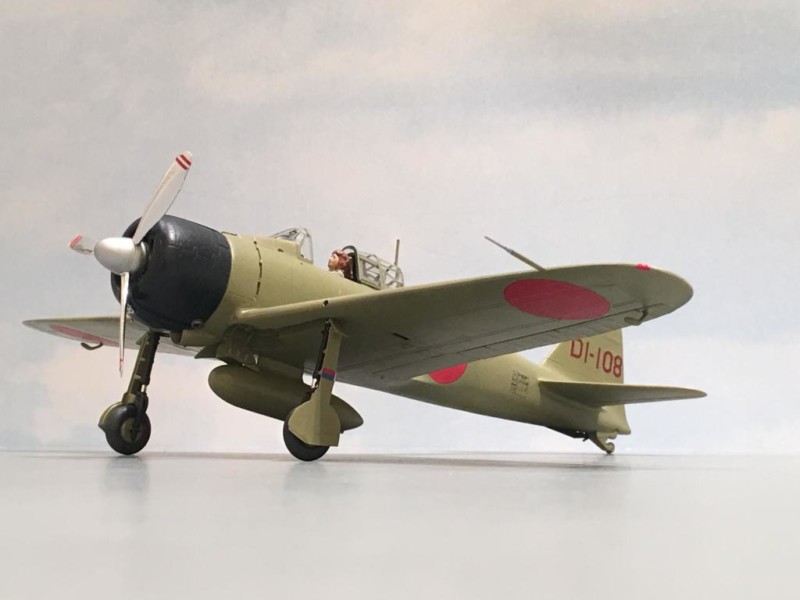
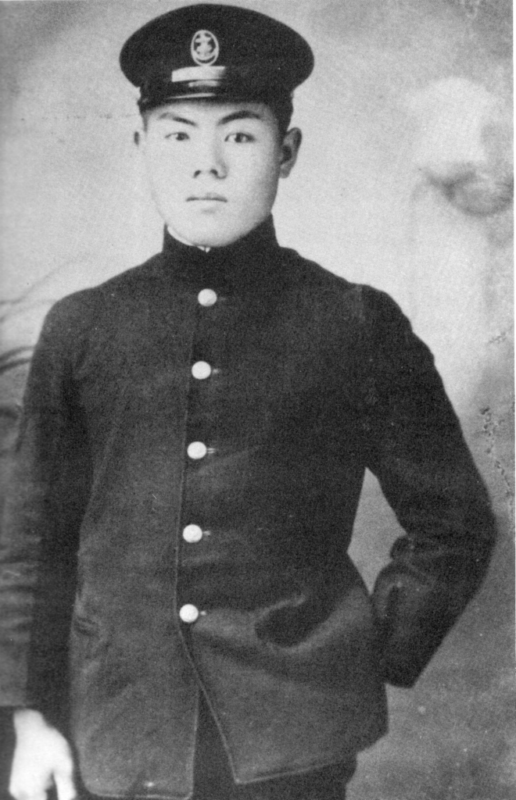
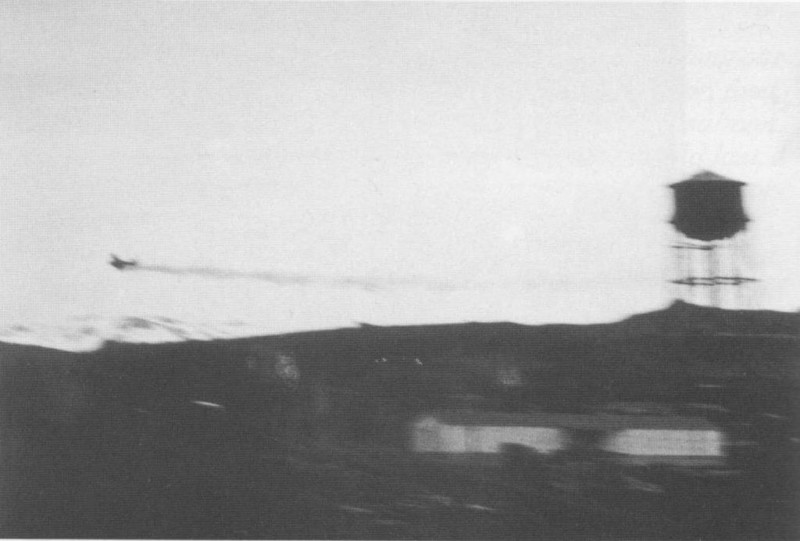
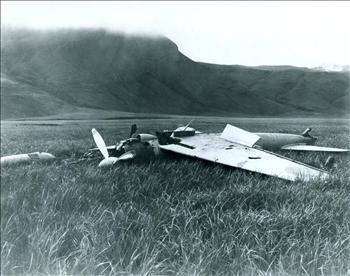
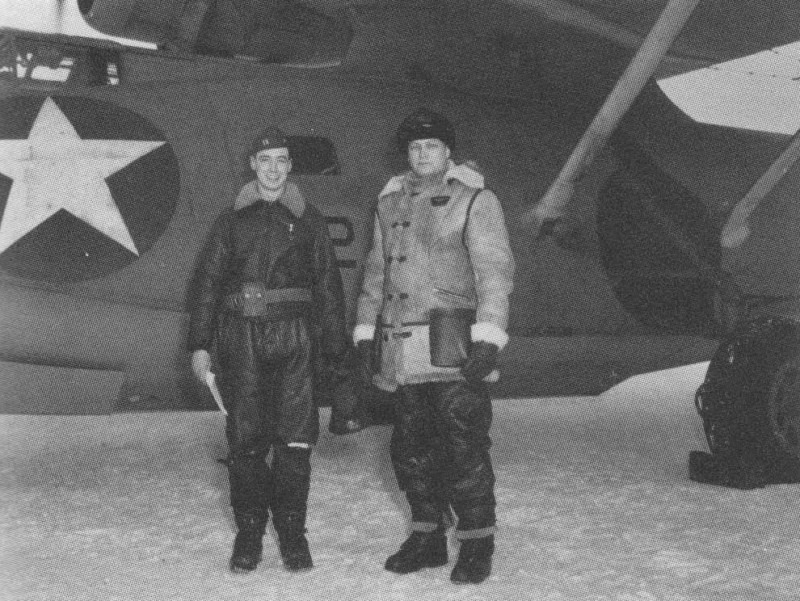


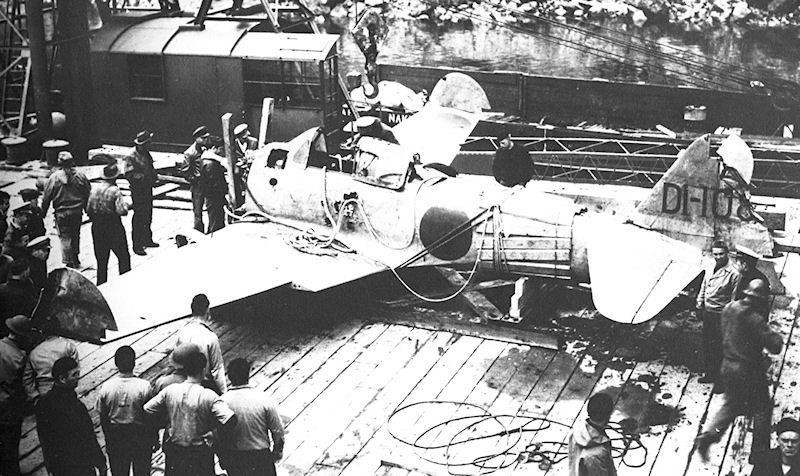
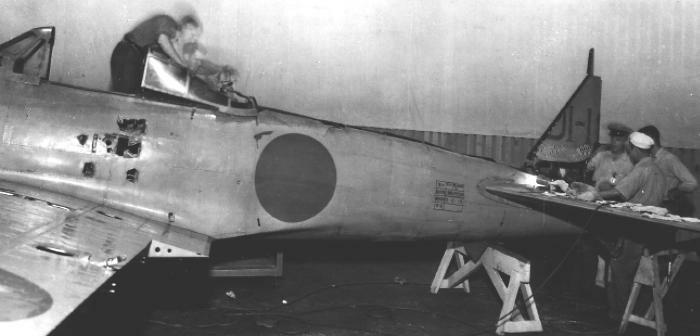
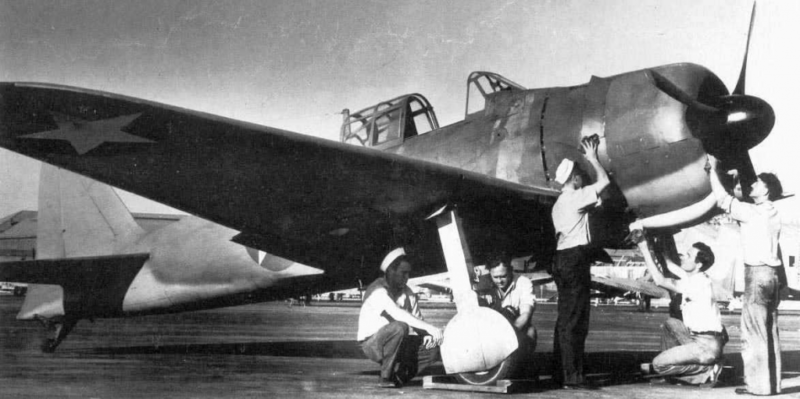
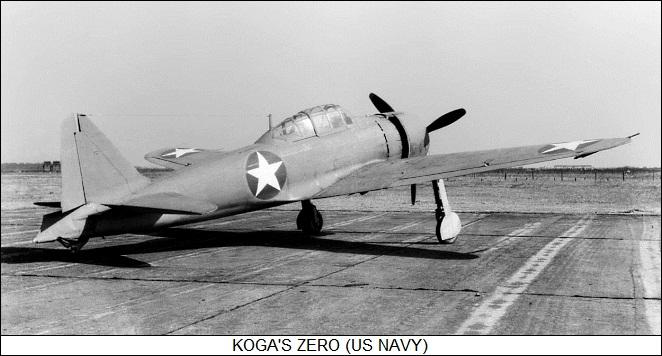
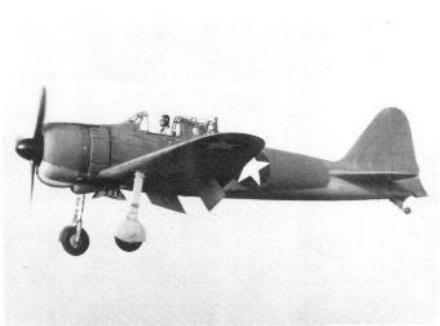

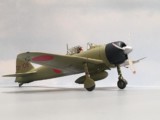
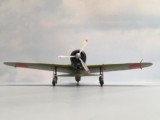
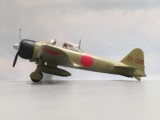
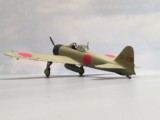
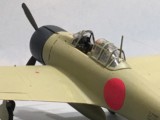
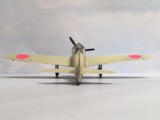
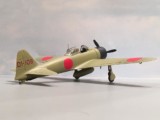
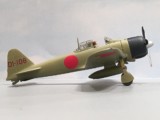
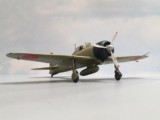
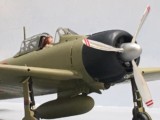
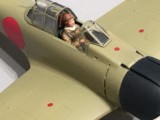
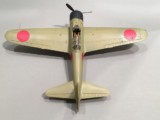
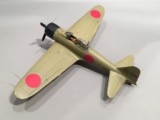
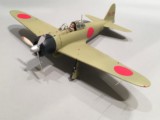
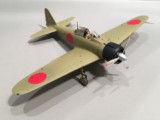
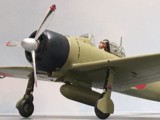
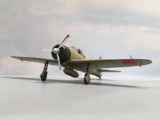
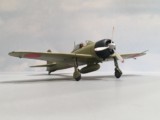
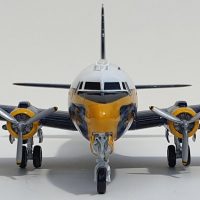
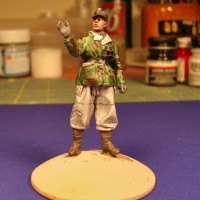
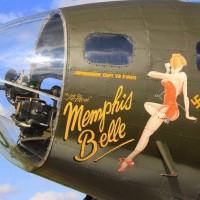
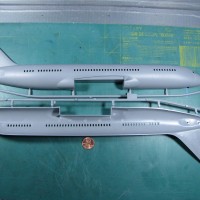
I've heard/read/seen the story about this particular airplane before, but don't recall seeing it modeled before, Louis. Nice build, nice pics, nice story - thanks.
Thanks Craig. I appreciate you compliments.
Excellent build, very interesting story. I assume by the thread that when then Navy restored it the paint scheme was intermediate blue?
It was painted in Blue Gray over Light Gray colors as best I can tell. The Intermediate Blue was a slightly different shade from Blue Gray and was used primarily with Dark Blue and White on the "Tri Color" schemes found a little later on.
Thanks for the compliments.
I may end up building the plane again, but this time with US Navy markings "under new ownership". The Bureau of Aeronautics even assigned a Bureau number for this plane.
I'm playing with the idea myself, and maybe a Hellcat under the rising sun.
That sounds like a very cool build. Go for it.
Great research and damn good modeling.
Thanks Tom !
Louis, Banzai! And my favorite early Zero, too! Captured aircraft (under new management) seems a (wink, wink, nudge, nudge) fertile field for a theme. (chuckle!)
Thanks Bernard. Hey you just never know ... 🙂 🙂 🙂 you might be on to something.
I really enjoyed the history Louis, and the model looks great to me. Well done on both counts! 🙂
Thanks Gary ! I'm glad you enjoyed this one ...
Good story and good build.It's a dandy little kit.
You know, I really enjoyed building this one. It's a very relaxing and simple one to do. Plus the fit is spot on. Throw in a simple one color finish and "presto" you can't go wrong... Typical Tamiya stuff.
I'm glad to hear that you enjoyed the article too. Thanks again my friend.
Another nice build Louis!
Thanks Greg !
You nailed the "caramel" color of the time period well great job!
Thanks Rob. I used Model Master FS 34201 "S.A.C. Bomber Tan" for the "Caramel Color" . I did some online research of surviving relic samples from Japanese wrecks, and this was one of the closest matches they came up with using the FS color deck.
As luck would have it, I recently found out that this color has been discontinued ... However I have seen it in spray cans still on the shelf. German RLM 02 is pretty close too, if you take things into account such as "scale shade" etc. .
Thanks again my friend.
Never miss the water 'til the well runs dry, Louis. Floquil made a color called Aged Concrete that was also close, and THEY ditched the whole line. I do hear good things about RLM 02, though perhaps we shouldn't give THEM ideas. MBA Bean counters.
I hear ya...
Great job, Louis! The history is interesting as well. This is such an iconic aircraft that was a Japanese warhorse for years!
Thanks Jeff.
The history behind this one is why I have wanted to build it for years now. I can scratch one more thing off my "bucket list"... 🙂
Thanks for liking the article too.
It was used right up to the very end of the War by the Japanese. Many late War Zero's met their fate as a "Kamikaze", while sadly the remaining ones found "stored" away for the anticipated US Invasion of Japan were melted down by the scrap man, per MacArthur's orders. Because of this, there are hardly any surviving examples of anything Japanese as far as WW2 aircraft are concerned.
But considering what just had happened during the previous years by using these "Implements of War", I totally understand the logic behind the order that MacArthur had implemented. Drastic times call for drastic measures they say...
Great model and research article. You really captured the moment Louis.
Thank you my friend !
Great build and story Louis
Thanks George.
Great story behind the build and I like the pilot figure included!